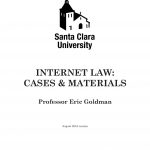
You probably recall this case. A California artist, Morford, created a work called “Banana and Orange” where he duct-taped the fruits to the wall. An Italian artist, Cattelan, created a work, “Comedian,” involving just a banana duct-taped to the wall….

by guest blogger Franklin Graves This week, I joined 100 other creators and creator economy professionals in attending the first ever White House Creator Economy Conference. The event, which I recapped in more detail for another publication, presented an interesting…

I’m pleased to announce the 2024 edition (15th edition) of my Internet Law casebook, Internet Law: Cases & Materials. The book is available as a PDF at Gumroad for $10, a Kindle ebook for $9.99, a softcover version for $20, and a hardcover version for $28. [All…

This case involves the CancelWatch “blog” on Substack, which says: “We report the activists trying to ruin people’s lives and careers.” In July 2023, it made a post entitled “Oliver D. Smith” that details Smith’s online activities and explains why…

Utah passed a terrible law claiming to be “for the kids,” which are increasingly prevalent at the state level. The court summarizes some of the law’s obligations: the Act requires covered websites to “implement an age assurance system,” “limit the…

by Kieran McCarthy Ryanair recently “prevailed” in its CFAA claim in its litigation against Booking.com. I use scare quotes around “prevailed” because, according to the jury verdict, the actual damages suffered by Ryanair were $5,000. $5,000 just so happens to…

Prior blog post. If I say so myself, it was a really good post–you should read it first and then read this post. In my prior post, I wrote: “I hope you enjoy these 2,800 words on legal topics you…

PETA promotes its animal rights agenda by making lots of online comments, an advocacy technique that may cross over from being aggressive to being annoying. In this case, they were such a nuisance on NIH’s Facebook and Instagram posts that…

The scenario: Google thought that a user uploaded CSAM and terminated her account. The user disagreed, appealed, and got nowhere. The user took the matter to court (pro se), where the lawsuit failed: Contract Breach. “Plaintiff does not allege any…

